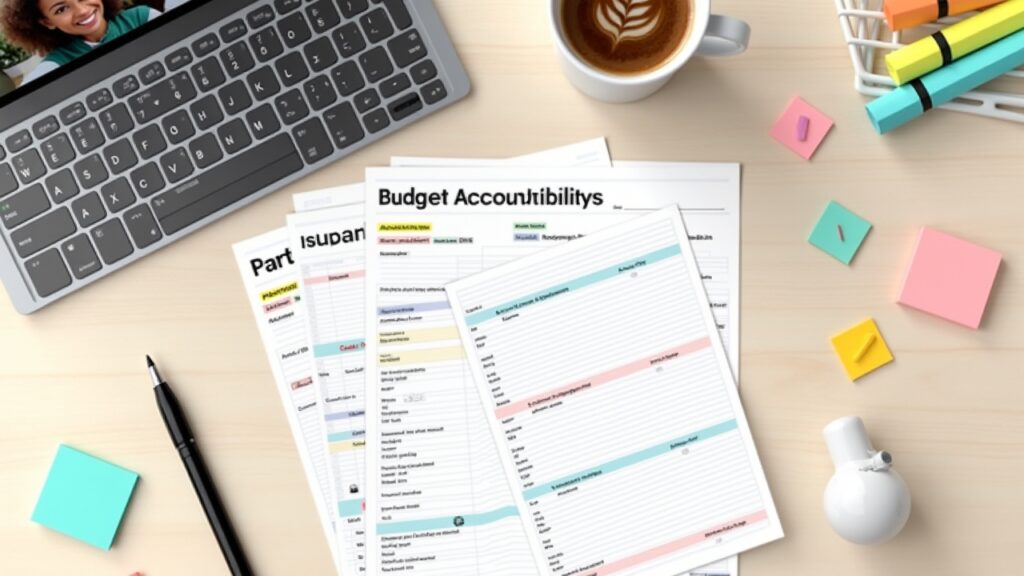Advertisements
Did you know that 92% of people abandon their financial goals by February? Yeah, that was me for years! I’d start January all fired up about budgeting, then by Valentine’s Day, I’d be buying overpriced lattes and wondering where my paycheck went.
Everything changed when I discovered the magic of having a budget accountability partner. It’s like having a gym buddy, but for your wallet. And trust me, after blowing through three emergency funds in two years, I needed all the help I could get.
What Even Is a Budget Accountability Partner?

A budget accountability partner is basically someone who keeps you honest about your money goals. They’re the person who texts you “Hey, did you transfer that $200 to savings?” when you conveniently “forget.”
I stumbled into this concept by accident. My coworker Sarah and I were complaining about our spending habits over lunch one day. We decided to check in with each other weekly about our financial goals, and boom – accidental accountability partnership was born!
The best part? You don’t need to share exact numbers if that makes you uncomfortable. Sarah doesn’t know I make $65K; she just knows I’m trying to save 20% of my income.
Why Having a Money Buddy Actually Works
Here’s the thing – we’re way more likely to follow through when someone else is watching. It’s basic psychology, really. Studies show that accountability increases success rates by up to 95%.
My first month with Sarah as my financial accountability partner, I saved more than I had in the previous six months combined. No joke. Just knowing I’d have to tell her I bought another plant (my weakness!) made me think twice.
Plus, celebrating wins together makes it actually fun. When I finally paid off my credit card, Sarah literally did a happy dance in the break room. Can’t get that from a budgeting app!
Finding Your Perfect Financial Accountability Match
Not everyone makes a good budget buddy – learned that the hard way. My first attempt was with my shopaholic sister. Bad idea. We enabled each other’s spending instead of stopping it!
Here’s what to look for:
- Someone with similar financial values (savers with savers, debt-crushers with debt-crushers)
- A person who’s reliable and won’t ghost you after two weeks
- Someone at a similar income level (optional, but it helps with relatability)
- Ideally, someone who’s not your romantic partner (keeps things less complicated)
I’ve found that coworkers, cousins, or friends from college work great. You want someone close enough to care but not so close that it gets weird talking about money.
Setting Up Your Partnership for Success
Okay, so you’ve found your person. Now what? Don’t just wing it like I did initially.
First, set clear expectations. How often will you check in? Weekly worked best for Sarah and me – daily was overkill, monthly was too easy to slack off. We do quick 15-minute video calls every Sunday evening.
Create some ground rules together:
- No judging each other’s past money mistakes
- Be honest about slip-ups (hiding that Target run defeats the purpose)
- Celebrate every win, no matter how small
- Keep each other’s financial info confidential
We use a simple shared spreadsheet to track our goals. Nothing fancy – just a basic budget template where we mark our progress with colorful checkmarks. Very kindergarten teacher of us, but it works!
Dealing with the Awkward Moments
Not gonna lie, it gets uncomfortable sometimes. Like when Sarah had to call me out for eating out five times in one week. Or when I had to ask her why she was considering a new car loan when she was still paying off credit cards.
The key is remembering you’re both on the same team. We developed this rule: always sandwich tough feedback between two positives. “Hey, you did amazing sticking to your grocery budget! I noticed the restaurant spending though. But your savings transfer went through – awesome!”
Sometimes one person struggles more than the other. That’s normal! When Sarah went through a rough patch and overspent for three weeks straight, we adjusted her goals temporarily instead of her feeling like a failure.
Virtual Options for Modern Budget Partnerships
Can’t find someone locally? No problem! Some of my best accountability relationships are online now.
There’s tons of online communities where you can find budget accountability partners. I’m in a Discord group with five other women who check in weekly. We share screenshots of our banking apps (with numbers blurred) to prove we hit our goals.
Apps like Honeydue or Goodbudget let you sync certain goals with a partner without sharing everything. Perfect for when you want accountability but also privacy.
Making This Work Long-Term
After two years with my accountability setup, here’s what I learned keeps it fresh. Switch up your check-ins occasionally. Sometimes we do coffee shop meetups instead of video calls. Makes it feel less like homework.
Also, evolve your goals together. Sarah and I started with basic budgeting, then moved to investing goals, and now we’re both working on side hustle income. Growing together keeps it interesting!
Don’t forget to review what’s working every few months. We ditched daily expense tracking after realizing weekly summaries worked better for our lifestyles. Your system should fit your life, not the other way around.
Your Next Money Move

Look, having a budget accountability partner isn’t some magical fix. You still gotta do the work. But man, it makes the journey so much easier and actually kinda fun.
Since starting this system, I’ve built a six-month emergency fund, paid off $8,000 in debt, and even started investing. Would I have done it alone? Maybe eventually. But definitely not this fast or with this much confidence.
Ready to level up your financial game? Start by asking one person this week if they’d be interested in being accountability partners. The worst they can say is no, and the best case? You both transform your money lives together. For more tips on mastering your money mindset and practical budgeting strategies, check out other posts on Cashflow Zen – we’re all about making finances feel less overwhelming and more achievable!



[…] you have ADHD. Your brain just needs different tools. And hey, if you’re looking for more tips on managing money and life with our wonderfully chaotic brains, check out other posts on Cashflow Zen. We’re […]